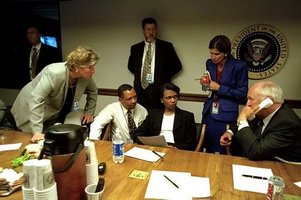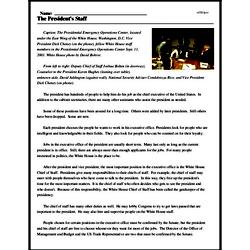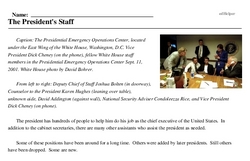The President's Staff
Caption: The Presidential Emergency Operations Center, located under the East Wing of the White House, Washington, D.C. Vice President Dick Cheney (on the phone), fellow White House staff members in the Presidential Emergency Operations Center Sept. 11, 2001. White House photo by David Bohrer.
From left to right: Deputy Chief of Staff Joshua Bolten (in doorway), Counselor to the President Karen Hughes (leaning over table), unknown aide, David Addington (against wall), National Security Adviser Condoleezza Rice, and Vice President Dick Cheney (on phone).
The president has hundreds of people to help him do his job as the chief executive of the United States. In addition to the cabinet secretaries, there are many other assistants who assist the president as needed.
Some of these positions have been around for a long time. Others were added by later presidents. Still others have been dropped. Some are new.
Each president chooses the people he wants to work in his executive office. Presidents look for people who are intelligent and knowledgeable in their fields. They also look for people who can be counted on for their loyalty.
Jobs in the executive office of the president are usually short term. Many last only as long as the current president is in office. Still, there are always more than enough applicants for the jobs. For many people interested in politics, the White House is the place to be.
After the president and vice president, the most important position in the executive office is the White House Chief of Staff. Presidents give many responsibilities to their chiefs of staff. For example, the chief of staff may meet with people themselves who have come to talk to the president. In this way, they free up the president's time for the most important matters. It is the chief of staff who often decides who gets to see the president and who doesn't. Because of this responsibility, the White House Chief of Staff has been called the gatekeeper of the presidency.
The chief of staff has many other duties as well. He may lobby Congress to try to get laws passed that are important to the president. He may also hire and supervise people on the White House staff.
People chosen for certain positions in the executive office must be confirmed by the Senate, but the president and his chief of staff are free to choose whomever they want for most of the jobs. The Director of the Office of Management and Budget and the US Trade Representative are two that must be confirmed by the Senate.




